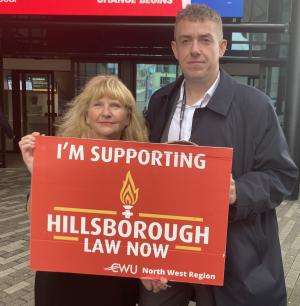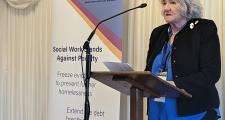BASW at Labour Party Conference 2024
Among the estimated 20,000 attending the conference was a small band of BASW staff bracing the wet Liverpool weather to learn what this new Labour government had planned for the months ahead.
The Top Lines
With the first Labour budget in 14 years due to take place on 30 October, it wasn’t a surprise that new policy announcements were thin on the ground. We'll learn more then about this government's spending plans for the year.
Policies that we did hear about were: ‘Homes for Heroes’ which is a new policy to give homeless veterans better access to housing waiting lists, along with young care levers and domestic abuse victims. A ‘Women’s Justice Board’ was announced by justice secretary Shabana Mahmood MP, which seeks to reduce the number of women’s prisons in the country as they are “forcing women into a life of crime.”
The King’s Speech earlier this year confirmed government plans for legislation this year, and we are soon expecting the Mental Health Bill, and the Children’s Wellbeing Bill. These are two major pieces of legislation that will impact social work greatly. But government spokespersons at the conference were very secretive about the content of these bills, and like everyone else in the sector we will have to wait and see what it is the government has planned when the bills are proposed.
On the fringes

Beyond the main conference hall, there were hundreds of fringe events taking place where politicians, members, and stakeholders could get into the detail of policy and how to further causes ranging from kinship care to foreign policy.
Issues affecting social work range far and wide, and there were more fringe events on than we could attend!
Children in Care
One of the first fringe events was on kinship care, chaired by John MacAlister MP, with personal stories shared by carers and young people.
There were calls for parental leave for kinship carers, as well as first-hand accounts from Kenya and Michael who shared their experiences of being raised by relatives due to parental neglect and mental health issues, highlighting struggles in the education system.
There were also calls for reforms to assessment processes, better legal aid access, and employment leave rights for kinship carers. Janet Daby MP appeared in a pre-recorded video and reaffirmed the government’s commitment to making kinship care a priority.
Child Poverty
Liz Kendall, Secretary of State for Work and Pensions, reflected on Labour’s past success in reducing child poverty and discussed the challenges ahead.
Child benefit has lost 20% of its value since 2010, with calls to update benefits and improve housing standards. Lived experiences were shared, calling for more humane support, kindness, and collaboration in tackling child poverty. We also heard of the impact of Universal Credit overpayments and sanctions.
Adult social care
Care Minister Stephen Kinnock acknowledged the care system is “broken but not beaten” and outlined Labour’s 10-year reform plan, including community care, prevention, and digitalisation. He pledged immediate action on a fair pay agreement for care workers, addressing the sector’s 130,000 vacancies and poor pay. The development of a Citizens’ Assembly is planned for next month, aimed at informing next year’s comprehensive Spending Review, for which the NHS 10-Year Plan is a key focus.
Wes Streeting, Health and Social Care Secretary, linked the social care crisis to the NHS crisis – indeed seeing social care primarily in the service of NHS stressing that reform is essential for both. The commitment to a ‘National Care Service’ (no detail as yet) was repeated in various forums alongside fair pay agreements, and long-term reforms to address complex care needs, particularly for disabled and older people. There was a focus on technology and building sustainable solutions with input from the sector and achieving consensus on structural changes in the NHS, with social care as an adjunct. There was also an acknowledgment from Labour that we need to upstream from treatment to prevention, analogue to digital, and from short to long term.
We also heard about the challenges in managing complex elderly cases, stressing the need for stronger community services to reduce unnecessary hospital admissions. A significant engagement exercise is planned soon regarding the 10-year plan for health and social care. Wes Streeting remarked, “NHS has more pilots than the RAF,” suggesting the need for more definitive action rather than endless trials.
Driving social care reform is perceived to be more challenging than NHS reform, because it is not centralised. Various comments from Streeting suggested how important it is that BASW and the adult social care sector can brief and get into dialogue with him. Other key issues identified include the ageing population, increased demand, high costs, and the perception of social care as primarily a service in support of the NHS rather than a service in its own right and as an equal partner in integrated services.
On carers, there was expressed interest in exploring a link between the earnings threshold for carers and the national minimum wage, with alerts triggered when carers approach the threshold. There was a discussion of a potential long-term National Carers Covenant from the government. Other future development areas include Carers Hubs, welfare advice, and nationally funded policies like paid carers’ leave.
Hillsborough Law Now

Keir Starmer announced that the government will introduce a new Hillsborough Law before the next anniversary of the disaster.
BASW England welcomed the commitment, calling it a "vital step towards ensuring justice, accountability, and transparency for all victims of public disasters and scandals."
Autistic people & people with a learning disability
The detention of people with disabilities was described as a national scandal, and panellists urged the government to redirect resources and hold the Care Quality Commission (CQC) accountable for inaction.
We also heard about the importance of supported housing for people with learning disabilities and autism, emphasising how it can provide more humane alternatives. Stephen Timms (Minister for Social Security and Disability) acknowledged the issue and referred to ongoing reforms to the Mental Health Act, which will restrict detaining people with learning disabilities and autism, only allowing it where therapeutic benefits are clear.
Racism and inequalities
There were multiple events at Labour conference on racism and inequality, especially looking at the riots that took place shortly after the Southport stabbings.
There was a discussion about the far right feeling empowered to cause disturbance due to social media and volatile language used by some politicians. There is nothing that justifies the conduct of the rioters, yet discussions on left behind communities often follow incidents like these.
Do people feel left behind? How can we prevent a blaming environment that can lead to hateful behaviour, and instead make the government act to end inequalities and a sense of feeling left behind? The aftermath of the riots showed the goodness of many people with neighbours cleaning up their communities and organising public events to show their support for diversity and multiculturalism.
Artificial Intelligence
Artificial intelligence poses significant challenges and opportunities for all parts of society, and this didn’t go unrecognised at Labour conference.
Peter Kyle, the Secretary of State for Science Innovation and Technology spoke about AI in his conference speech, and the role it plays in living longer and healthier lives. In the fringe: businesses, organisations, and individuals came together to talk about the role AI can play but also why it needs to be better and more specific. AI could reduce the administrative workloads of frontline public sector workers when it comes to writing reports that take people away from working with people – but first it has to be better than what humans can do.
Environment and climate
The climate crisis is a danger to us all, and no political party serious about governing would push the issue to the sidelines.
In his speech, Keir Starmer spoke about climate change requiring a decisive government prepared to face the future. We’ve heard before about Labour’s Great British Energy plan, and that appears to be a priority for this governments first year in power, but we as a country need to look beyond that at how we can get people working together. For many people, tackling the climate crisis is the responsibility of government and not a personal one, but we will achieve far more with community buy-in.



